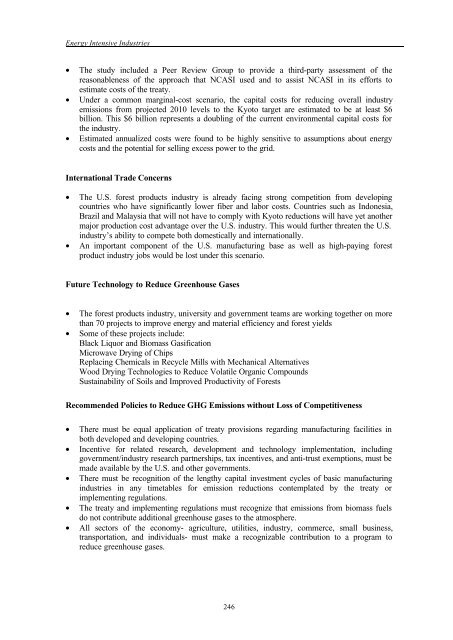sectoral economic costs and benefits of ghg mitigation - IPCC
sectoral economic costs and benefits of ghg mitigation - IPCC
sectoral economic costs and benefits of ghg mitigation - IPCC
You also want an ePaper? Increase the reach of your titles
YUMPU automatically turns print PDFs into web optimized ePapers that Google loves.
Energy Intensive Industries<br />
• The study included a Peer Review Group to provide a third-party assessment <strong>of</strong> the<br />
reasonableness <strong>of</strong> the approach that NCASI used <strong>and</strong> to assist NCASI in its efforts to<br />
estimate <strong>costs</strong> <strong>of</strong> the treaty.<br />
• Under a common marginal-cost scenario, the capital <strong>costs</strong> for reducing overall industry<br />
emissions from projected 2010 levels to the Kyoto target are estimated to be at least $6<br />
billion. This $6 billion represents a doubling <strong>of</strong> the current environmental capital <strong>costs</strong> for<br />
the industry.<br />
• Estimated annualized <strong>costs</strong> were found to be highly sensitive to assumptions about energy<br />
<strong>costs</strong> <strong>and</strong> the potential for selling excess power to the grid.<br />
International Trade Concerns<br />
• The U.S. forest products industry is already facing strong competition from developing<br />
countries who have significantly lower fiber <strong>and</strong> labor <strong>costs</strong>. Countries such as Indonesia,<br />
Brazil <strong>and</strong> Malaysia that will not have to comply with Kyoto reductions will have yet another<br />
major production cost advantage over the U.S. industry. This would further threaten the U.S.<br />
industry’s ability to compete both domestically <strong>and</strong> internationally.<br />
• An important component <strong>of</strong> the U.S. manufacturing base as well as high-paying forest<br />
product industry jobs would be lost under this scenario.<br />
Future Technology to Reduce Greenhouse Gases<br />
• The forest products industry, university <strong>and</strong> government teams are working together on more<br />
than 70 projects to improve energy <strong>and</strong> material efficiency <strong>and</strong> forest yields<br />
• Some <strong>of</strong> these projects include:<br />
Black Liquor <strong>and</strong> Biomass Gasification<br />
Microwave Drying <strong>of</strong> Chips<br />
Replacing Chemicals in Recycle Mills with Mechanical Alternatives<br />
Wood Drying Technologies to Reduce Volatile Organic Compounds<br />
Sustainability <strong>of</strong> Soils <strong>and</strong> Improved Productivity <strong>of</strong> Forests<br />
Recommended Policies to Reduce GHG Emissions without Loss <strong>of</strong> Competitiveness<br />
• There must be equal application <strong>of</strong> treaty provisions regarding manufacturing facilities in<br />
both developed <strong>and</strong> developing countries.<br />
• Incentive for related research, development <strong>and</strong> technology implementation, including<br />
government/industry research partnerships, tax incentives, <strong>and</strong> anti-trust exemptions, must be<br />
made available by the U.S. <strong>and</strong> other governments.<br />
• There must be recognition <strong>of</strong> the lengthy capital investment cycles <strong>of</strong> basic manufacturing<br />
industries in any timetables for emission reductions contemplated by the treaty or<br />
implementing regulations.<br />
• The treaty <strong>and</strong> implementing regulations must recognize that emissions from biomass fuels<br />
do not contribute additional greenhouse gases to the atmosphere.<br />
• All sectors <strong>of</strong> the economy- agriculture, utilities, industry, commerce, small business,<br />
transportation, <strong>and</strong> individuals- must make a recognizable contribution to a program to<br />
reduce greenhouse gases.<br />
246
















